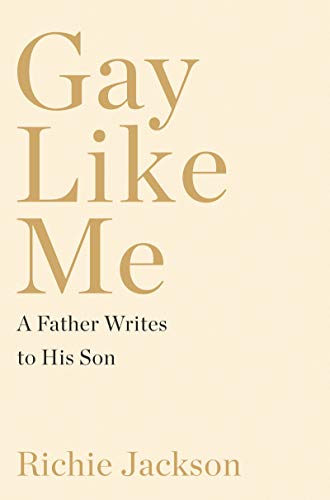Gay Like Me: A Father Writes to His Son

“Gay Like Me is not just an expression of love, but it is a collection of parental advice many LGBTQ+ youth will never otherwise have.”
Richie Jackson, a gay man, had a son through surrogacy in the year 2000. When the son became a teenager, he came out to Jackson as also being gay. Gay Like Me is Jackson’s attempt to explain his own experience as a gay man in America and convey what he has learned in the process. The book seems conceived as having a double audience, as Gay Like Me is simultaneously a deeply personal letter from Jackson to his son and a guidebook to a rising queer generation.
Gay Like Me is divided into a number of short chapters, some of them almost meditations. Many of the titles are suggestive: “Visibility Is Not a Cure-All,” “Find and Ignite Your Anger,” “Buttress Yourself with Gay History,” and “It’s Still a Straight Man’s World.”
Jackson is often at his best when dissecting how some marks of progress aren’t nearly as positive as they seem on the surface. One of the most interesting chapters, “Words Matter,” deconstructs some of the language that surrounds gay life, showing how even seemingly positive terms, such as “openly gay,” contain their own toxins. The term, he writes, “expresses surprise, shock, that someone gay is actually, officially, not hiding in plain sight. Openly applauds audaciousness, signaling that an out gay person is not the norm and that this particular gay person isn’t as shameful as warranted . . . Openly gay reverberantly reinforces the negative because the qualifier itself substantiates a disapproving origin.”
He is similarly strong in those moments when he shares some of the deeply personal details of his family life. The story of his son’s premature birth and the severe complications that followed is no less than harrowing: “You were so sick and your life so precarious. At one critical point, you needed a blood transfusion. Because your [other] father and I are gay, we were prohibited by U.S. Food and Drug Administration regulations to be your blood donors. We had been parents for just two months; you were laying in an incubator, unable to breathe on your own, hooked up to a dozen wires; and because we were gay we couldn’t take care of you. . . .”
Unfortunately, neither penetrating analysis nor vividly drawn personal narrative dominate the book, and some portions don’t contain enough of either. Perhaps with Jackson’s double audience in mind, parts of Gay Like Me are written in generalities that seem intended to reach as many people as possible, but that ultimately serve to repeat certain themes without further illuminating them: I’m thrilled for you, but I’m worried about your future. The world is more accepting now than when I was your age, but it’s not as accepting as you might think. Your life will be glorious, but it will be hard. Thoughts like these, while expressing an ambivalence that is certainly understandable, are reprised a little too often without always being sufficiently grounded in either insightful critique or lived experience.
Occasionally, Jackson’s thoughts are inconsistent, if not contradictory, as when he writes, “How someone identifies is a personal choice. You are gay and biracial, and neither needs to have primacy. It’s up to you.” In the next paragraph, he declares, “Every decision you make needs to support your gayness. . . . When being gay is the filter to which you view everything else, the well from which all your emotions, actions, and reactions spring, you will have good gay esteem.” Taken separately, either statement is a valid expression of opinion. In juxtaposition, they’re a bit confusing.
Still, it is impossible to find fault with the book’s intentions, nor can anyone doubt the depth and sincerity of Jackson’s love for his son. More broadly, Gay Like Me is not just an expression of love, but it is a collection of parental advice many LGBTQ+ youth will never otherwise have. Queer children growing up in straight families often feel like strangers in the group that is supposed to provide them with the strongest bonds. Gay Like Me will make many of them feel as if they finally have the mentor they never had: an older, wiser relative who will speak to them with candor and affection about experiences no one else in the family shares.